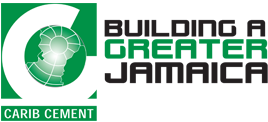Carib Cement partners with government stakeholders to address problem of used tyres at the Riverton Landfill
Remarks:
At Carib Cement, we believe that building a Greater Jamaica is more than a tag line. It is the reason more than 500 men and women come to work at our plant every day.
We believe that building a greater Jamaica for our Employees, Customers, Shareholders, Communities and the Country go hand in hand with building a sustainable and profitable company.
Today is another demonstration of our commitment to building a greater Jamaica.
Minister Vaz and I began dialogue on this issue over a year ago after one of the fires at Riverton. We immediately began to look for the best way to partner with the Country and become part of the solution.
Our team at Carib Cement looked at the possibility of using shredded tyres, but the high cost involved in the shredding process, and transportation made it unfeasible.
We then analyzed the possibility of using whole tyres, but this created other issues, such as: the cost of making adjustments to our kiln process, the significant initial investment in our facilities and the much higher operating costs associated with the burning of the tyres. However, we continued work on scenarios until we found a potentially viable one.
The approach we have settled on is not one that is economically profitable to us, however there is greater benefit in its potential to be a long term solution for disposing of tyres dumped at the Riverton Landfill. We have the capacity to help with this problem and the bottom line for us is that it is part of our social responsibility to assist.
Today, after more than one year of working with the GoJ on the planning stage, we are ready to move on to the execution stage. We are pleased to be here to cement our commitment, and to start an industrial trial which, if proven successful, will see Carib Cement significantly reducing tyres in Riverton landfill in about 5 years.
We are committed to the success of this project because it is good for the environment and the health and safety of Jamaicans. This partnership has the potential to be another example of joint solutions between government and private sector.
Our parent company CEMEX, is currently the worldwide leader in alternative fuels usage for cement production. Increasing alternative fuels is an essential piece of our long term sustainability strategy.
CEMEX’s strong commitment is to migrate to cleaner energy sources and to displace traditional fossil fuels like coal with low or even zero-carbon alternatives —such as municipal solid waste, tires, and biomass residues.
By this project, our Jamaica’s could be held up as an example, as are CEMEX operations in Poland, Latvia, Czech Republic or Germany, where successful partnerships resulted in the conversion of more than 900,000 tonnes of solid waste in 2017.
In 2017, globally 26.2 per cent of the fuels used by the CEMEX group was from alternative sources. Here in Jamaica, at Carib Cement we currently use around 4 per cent alternative fuel in our process. Our goal is to increase this number in the coming years.
I want to end by describing a little bit of the process. The tyres will be burnt in our kiln at 1,400 degrees Celsius. There is a huge difference for the environment when tyres are burned at 1,400 degrees in a kiln, than in an incinerator at 600 degrees. In an incinerator, it would produce toxic gases, but at 1,400 degrees in our kiln, it won’t; and the ashes will be incorporated within our process, just as fuels we use.
I want to thank our team at Carib Cement and our partners at the various agencies for getting us to this point. We will do our best to overcome any hurdle which presents itself along the way so that this can be an enduring solution for the people of Jamaica.
Thank you.
*Statement delivered on July 22 by Peter Donkersloot General Manager on the occasion of the signing of the Memorandum of Understanding with the Ministry of Local Government and Community Development; Ministry of Economic Growth and Job Creation and National Solid Waste Management Authority for the Pilot Project to dispose of used tyres.

